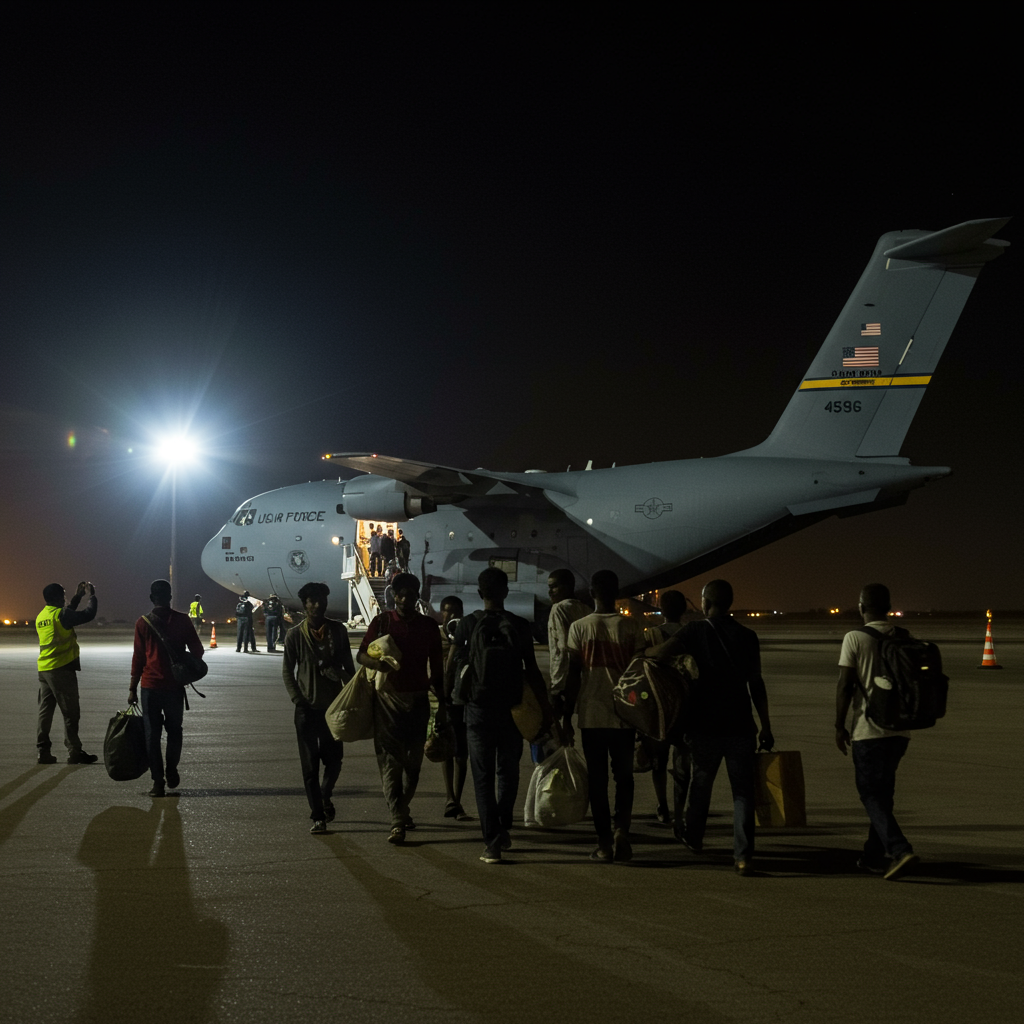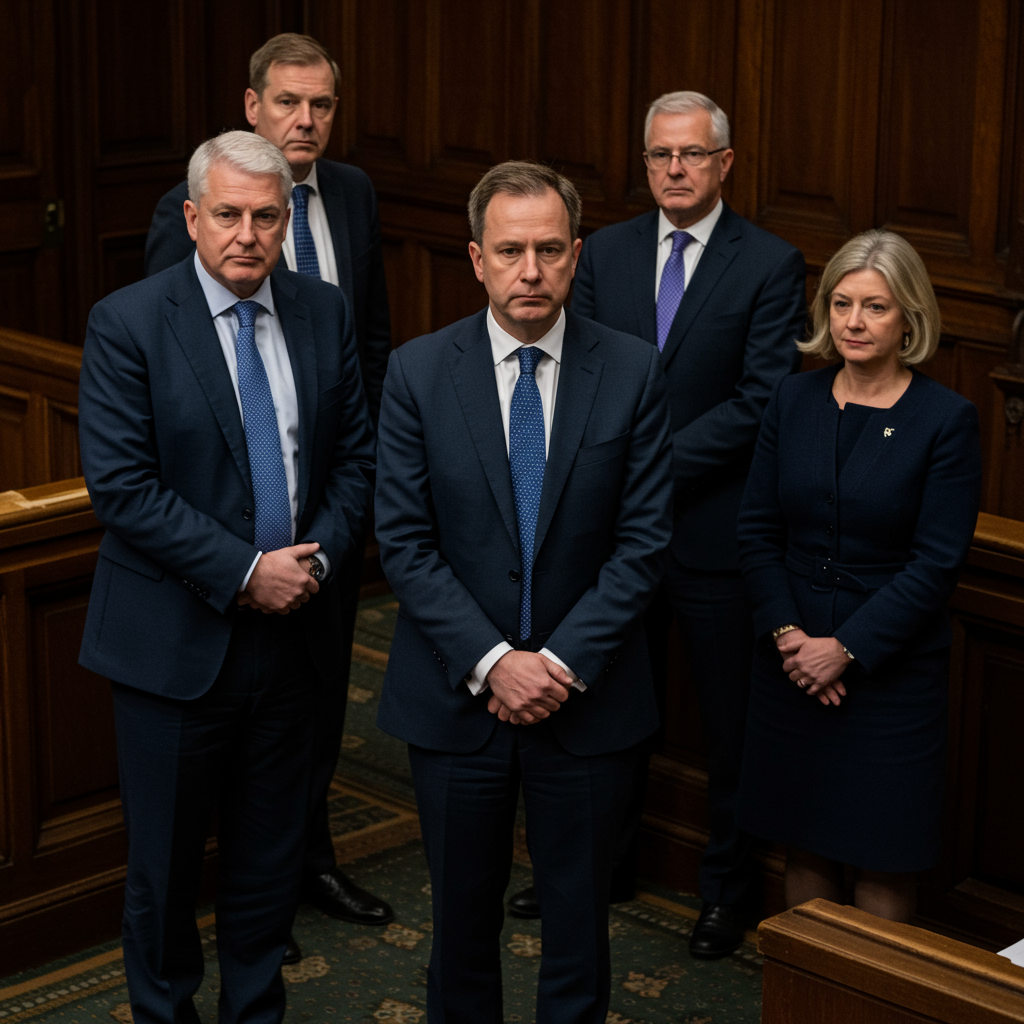In a dramatic conclusion to a complex legal and logistical saga, a U.S. military flight carrying eight migrants previously held for weeks in challenging conditions landed in south Sudan just before midnight on a recent Friday. This controversial deportation brought an end to a standoff that had kept the men in legal limbo on a U.S. military base in Djibouti, Africa, after a federal judge halted an earlier attempt to remove them. The resolution came only after the U.S. Supreme Court intervened, allowing the government’s plan to send the individuals, convicted of crimes in the United States, to the volatile nation.
The flight’s departure, confirmed by Homeland Security officials, marked the culmination of a six-week battle fought in U.S. courts. A picture shared by the department depicted the scene aboard the aircraft: the men appeared handcuffed and shackled at their ankles, surrounded by uniformed personnel. While the U.S. government asserted the removal complied with legal standards, immigration lawyers and a federal judge contended the process violated fundamental due process rights, particularly concerning deportation to a third country where migrants might face severe danger. The ultimate fate of the eight men upon their arrival in South Sudan remains uncertain, adding another layer of concern to an already contentious case.
A Controversial Decision Concludes Legal Battle
The flight to South Sudan concluded a period of significant uncertainty for the individuals involved. After being held for weeks on Camp Lemonnier, a U.S. military base in Djibouti, the movement of the eight men was executed swiftly once the final legal hurdles were cleared. A Homeland Security spokeswoman confirmed the military plane took off late one evening, signifying the administration’s determination to complete the deportation despite ongoing legal challenges and humanitarian concerns. The image of the men restrained during the flight underscored the gravity and high-security nature of the operation.
The sequence of events leading to this flight involved multiple court challenges, centered on the government’s authority to deport individuals to countries other than their homeland, especially when potential risks are high. The Supreme Court’s emergency intervention proved decisive, clearing the path for the government to proceed with the controversial removal plan. This high-stakes legal maneuvering highlighted the deep divisions over U.S. immigration policy and the extent of due process afforded to migrants, particularly those with criminal records.
Weeks Stranded: The Djibouti Limbo
The legal battle that temporarily halted the deportation left the eight migrants and their U.S. escorts stranded in the harsh environment of Djibouti. Since late May, according to reports, both groups were confined at a U.S. naval facility on Camp Lemonnier. The conditions they faced were far from ideal and reportedly led to significant health issues.
The migrants were housed in a converted shipping container, previously repurposed as a conference space. Living conditions were described as challenging, with limited access to basic facilities. Detainees were reportedly allowed only one shower per day, with security checks conducted even during bathroom visits. The bathroom facilities themselves were located 40 yards away from their confinement area, requiring escorts. Insufficient lighting at the site also posed security concerns for both personnel and detainees.
The 13 U.S. Immigration and Customs Enforcement (ICE) officers tasked with supervising the deportees also experienced difficulties. Accommodation was severely constrained, with only six beds available for the 13 personnel, forcing them to sleep in shifts. Officers reported respiratory issues, suspected to be linked to local burn pits. The environment itself presented considerable risks, including high daytime temperatures exceeding 100°F (38°C) and a risk of malaria, partly due to a reported lack of preventative medication provided before their arrival. Diagnostic facilities on site were described as inadequate for addressing the health concerns. Compounding the risks, officials reportedly warned the ICE officers upon arrival of an “imminent danger of rocket attacks from terrorist groups in Yemen,” yet the officers reportedly lacked body armor or other appropriate gear for such a threat.
Who Were the Deported Individuals?
The group of eight men deported to South Sudan originated from diverse backgrounds, underscoring the global reach of U.S. immigration enforcement. Their home countries included Vietnam, Mexico, Laos, Cuba, Myanmar, and South Sudan. Notably, only one of the eight men was actually a national of South Sudan.
The U.S. government justified its efforts to deport these individuals by citing their criminal histories. According to statements from Department of Homeland Security (DHS) officials, the men had been convicted of serious crimes in the United States. Specific offenses mentioned by government spokespersons included murder, sexual assault, rape, homicide, and armed robbery, which DHS characterized as “uniquely barbaric.” While many of the men had either finished or were nearing the completion of their sentences, their criminal records played a central role in the government’s determination to remove them. Officials stated that many of these men were being sent to a third country because their countries of origin had refused to accept their return.
The Core Legal Challenge: Third-Country Deportation
At the heart of the protracted legal dispute was a fundamental question in immigration law: how much due process is required when the U.S. government seeks to deport individuals to countries other than their native lands? Such destinations, often referred to as “third countries,” become particularly controversial when there is a potential risk of torture or persecution upon arrival.
Federal law explicitly limits deportations to places where a migrant’s “life or freedom would be threatened.” This principle is not unique to U.S. law; the prohibition against returning individuals to places where they face torture or persecution is a cornerstone of international law. The legal battle revolved around whether the government’s procedures adequately protected this principle for the eight men, especially given the known risks associated with the intended destination. Advocates argued that sending individuals to a country like South Sudan without a proper opportunity to raise concerns about their safety violated both U.S. and international legal standards.
Clash with Federal Courts
The Trump administration’s attempt to deport the eight men faced significant resistance from the judiciary, particularly from U.S. District Court Judge Brian Murphy in Massachusetts. Judge Murphy had previously issued an injunction prohibiting the government from deporting individuals to third countries without first providing them a meaningful opportunity to articulate fears of persecution or torture and access legal counsel.
When the government proceeded with the initial deportation attempt, Judge Murphy ruled that their actions were “unquestionably violative” of his prior order. He highlighted that the migrants were given insufficient notice of their impending deportation and destination – reportedly receiving notification late in the evening, outside of business hours, just hours before their flight. This lack of timely and accessible notice, the judge reasoned, made it “impossible” for the individuals to effectively object to their removal or consult with an attorney or family members.
Administration officials pushed back against the judge’s ruling, asserting that their actions were in “full compliance with all court orders.” They argued that the migrants had previous opportunities within the immigration system to express fears about deportation to a third country, or suggested the judge’s initial order lacked clarity regarding notice requirements. Government spokespersons characterized the deported men as “vicious criminals” and “true national security threats,” while also publicly criticizing “activist judges” who, in their view, were impeding efforts to remove dangerous individuals.
The Supreme Court’s Intervention
The legal skirmish escalated to the highest court in the land. According to reports, the Supreme Court weighed in on the case multiple times. Ultimately, the Supreme Court’s intervention proved critical, siding with the Trump administration and allowing their plan to send the men to South Sudan to move forward. This decision effectively overturned lower court blocks and cleared the way for the eventual deportation flight, bringing an end to the weeks of legal uncertainty that had left the men stranded in Djibouti. The Supreme Court’s action underscored the executive branch’s broad authority in matters of immigration and national security, even in the face of judicial challenges centered on due process rights.
Risks and Uncertainties in South Sudan
The choice of South Sudan as a deportation destination for the eight migrants drew considerable criticism and raised serious humanitarian concerns. The 13-year-old country is currently grappling with significant instability, described by some as being on the brink of civil war despite a prior power-sharing agreement.
The U.S. State Department has issued a stern travel warning for South Sudan, advising Americans not to travel there due to the high risk of “crime, kidnapping and armed conflict.” The department had even ordered the departure of non-emergency personnel from the country months prior to the deportation. State Department reports also highlight severe human rights problems within South Sudan. The U.S. government’s own assessment of the country’s conditions is so dire that it grants Temporary Protected Status (TPS) to some South Sudanese nationals already residing in the United States, acknowledging the unsafe conditions that prevent their return home.
Adding to the uncertainty, South Sudanese officials initially stated they had no knowledge of the migrants arriving in their country. Police spokespersons indicated they would investigate and potentially “redeport” any non-nationals found to have arrived this way. Human rights advocates questioned the logic of sending individuals convicted abroad to a nation already facing internal conflict and human rights issues. The long-term safety and immigration status of the eight men in South Sudan remain unknown, leaving their ultimate fate hanging in the balance.
Broader Context of Immigration Policy
This specific case unfolded within the broader context of the Trump administration’s aggressive approach to immigration enforcement. The administration frequently sought to increase deportations, targeted individuals with criminal records, and clashed with federal judges whose rulings challenged these policies. The pursuit of agreements with third countries to accept deportees whose home nations refused them became a notable tactic, as did the consideration of measures like the Alien Enemies Act in certain removal cases.
Immigration rights lawyers argued throughout the legal battle that the government was treating due process not as a guaranteed right, but as a privilege to be withheld, especially from individuals deemed “unpopular.” While Judge Murphy later ordered that the men be given reasonable fear interviews in private with access to counsel after their deportation, advocates deemed this a “logistical nightmare” that unfairly burdened the migrants due to the government’s initial violation of due process requirements. The case underscores the tension between the executive branch’s power in immigration matters and the judiciary’s role in upholding constitutional and statutory rights.
Frequently Asked Questions
Why were these migrants sent specifically to South Sudan?
The decision to send the eight migrants to South Sudan stemmed primarily from the fact that their home countries – Vietnam, Mexico, Laos, Cuba, Myanmar, and in one instance, South Sudan itself – had reportedly refused to accept their return after they completed sentences for crimes in the United States. With other typical deportation destinations unavailable, U.S. authorities arranged for their transfer to South Sudan, a plan that became the focus of the subsequent legal challenges.
What were the living conditions like for the migrants and staff stranded in Djibouti?
During the weeks they were in legal limbo, the eight migrants and 13 ICE officers were held on a U.S. military base in Djibouti under difficult conditions. The migrants were confined in a converted shipping container, with limited bathroom access located 40 yards away and security checks during use. ICE officers faced crowded accommodations, sleeping in shifts due to limited beds. Both groups experienced health issues potentially linked to high temperatures, malaria risk, and burn pits, with inadequate medical facilities and a lack of appropriate gear despite warnings of potential rocket attacks.
Was the U.S. government’s action legally challenged, and what was the outcome?
Yes, the U.S. government’s plan to deport the migrants to a third country like South Sudan was legally challenged. A federal judge in Massachusetts, Judge Brian Murphy, had issued a prior order requiring due process before such deportations. He ruled that the administration violated this order by providing insufficient notice. The case went to the Supreme Court, which ultimately sided with the Trump administration, allowing the deportation plan to proceed and concluding the weeks-long legal battle that had temporarily stranded the group in Djibouti.
Conclusion
The deportation of eight migrants to South Sudan marks the culmination of a tense legal and humanitarian standoff. Resolved by intervention from the nation’s highest court, the move ended weeks of precarious limbo for the men stranded on a military base in Djibouti. While the U.S. government emphasized the individuals’ criminal histories and asserted the legality of its actions, the case highlights fundamental questions about due process, particularly when deporting individuals to potentially dangerous third countries. Despite the legal battle concluding with the flight’s landing, the inherent risks in South Sudan and the unknown fate of the deported men leave a significant cloud of uncertainty over the outcome, underscoring the complex and often controversial nature of immigration enforcement.




